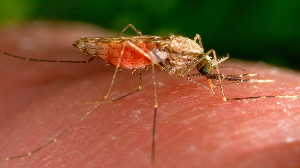Djibouti has released swarms of genetically engineered mosquitoes in a suburb in the country in a pilot project to fight malaria.
The initiative, dubbed the Djibouti Friendly Mosquito Programme, targets the highly invasive Anopheles stephensi mosquito, which has caused a dramatic rise in urban malaria cases in Djibouti’s capital city and is rapidly spreading elsewhere in the Horn of Africa.
This is the first time a genetically engineered mosquito has been released in East Africa, and the second time on the African continent.
The Djibouti Friendly Mosquito Programme is a collaboration between Djibouti’s National Malaria Control Programme, the public health not-for-profit Association Mutualis, and University of Oxford founded Oxitec Ltd, a leading developer of biological solutions to control disease-transmitting pests.
Several thousands of these friendly (male) mosquitoes were released in Ambouli, a community in Djibouti City. Officials have indicated that several more releases are planned in the coming weeks.
Uganda is also poised to take similar action through a partnership between Oxitec, the Uganda Virus Research Institute and the Ugandan Ministry of Health.
The collaboration, according to an announcement made by the partners in January in Uganda, aims to develop a genetically engineered mosquito solution targeting Anopheles funestus, a significant contributor to malaria transmission in East Africa. However, the timeline for the release in Uganda remains unclear.
The first release of a genetically-modified strain of the malaria mosquito on the continent happened in Burkina Faso in 2019, where GE strains of the Anopheles coluzzii were released in the village of Bana in Western part of the country. The mosquito strain used there was genetically modified to be sterile, so it can mate but cannot produce offspring.
In the Djibouti case, the genetically engineered mosquitoes are non-biting males carrying a self-limiting gene that prevents female offspring from surviving to adulthood, thereby reducing the mosquito population over time.
These mosquitoes carry a self-limiting gene that is only activated in females, therefore preventing females from surviving; males are not affected by this gene, so can survive as normal.
This gene blocks the female mosquito’s cells from carrying out normal cellular processes and from producing many of the other proteins required for normal mosquito development. This stops female larvae from developing into adults.
Since only female mosquitoes spread malaria, the spread of disease should drop off quickly along with their population.
Crafted to be harmless to local ecosystems, according to the scientists, this technology has already proven successful in controlling the dengue-transmitting Aedes aegypti mosquito in Brazil, achieving a population reduction of over 95 percent in targeted areas.
The Anopheles stephensi mosquito is an invasive malaria vector recently reported in Djibouti, Kenya, Ethiopia, Sudan, Somalia, Nigeria and Ghana, and cities across Africa are at risk as this city-dwelling mosquito continues to spread.
In 2012, Djibouti had nearly eradicated malaria, with only 27 cases reported that year. However, by 2020, malaria cases soared to over 73,000.
This dramatic increase has been driven by the arrival and spread of the Anopheles stephensi mosquito – a highly invasive species which thrives in urban environments, considered among the major threats to malaria elimination in sub-Saharan Africa.
These mosquitoes are daytime biters which evade interventions such as bed nets and have developed resistance to chemical insecticides making traditional control methods less effective. As it continues to spread, Anopheles stephensi is predicted to threaten more than 100 million people living in cities across Africa.
Director of Association Mutualis, Bouh Abdi Khaireh, underscored the pressing need for new interventions. “Malaria is a debilitating disease. Not long ago, it was extremely rare in our communities. Now, we see malaria patients suffer daily across Djibouti. We’re excited to see what the Friendly mosquitoes can achieve to combat this national health threat,” Khaireh said.
The release follows rigorous review and approval by Djibouti’s regulatory authorities, as well as the importation of the mosquitoes in December 2023.
The exercise will be accompanied by extensive monitoring to study the behavior and impact of the mosquitoes in Djiboutian communities.
Over two years, detailed studies of Anopheles stephensi distribution and behavior were conducted in Djibouti, complemented by deep local community and stakeholder engagement. Health officials, community leaders, and regional experts participated in workshops and public meetings, contributing to the program’s design and implementation.
Colonel Dr Abdoulilah Ahmed Abdi, Health Advisor to the President of Djibouti, emphasized the government’s commitment to reversing the rising malaria transmission rates, noting that Djibouti is setting a precedent for the rest of Africa in combating this persistent public health challenge.
“Today’s launch is a significant national milestone. We hope our pilot release of Oxitec’s innovative friendly mosquitoes will serve as a blueprint for other nations facing similar challenges with the spread of malaria,” he said.
CEO of Oxitec, Grey Frandsen, highlighted the urgency of modernizing malaria control methods. “Decades of progress in the race to end malaria are at risk as mosquitoes adapt and outsmart human interventions. Our (GE) mosquitoes are already proven in Brazil’s fight against dengue fever, and we’re honored to be serving communities in Djibouti,” Frandsen stated.
Click to view details



Africa News of Sunday, 2 June 2024
Source: theeastafrican.co.ke
Djibouti breaks new ground in war on malaria
Opinions
















